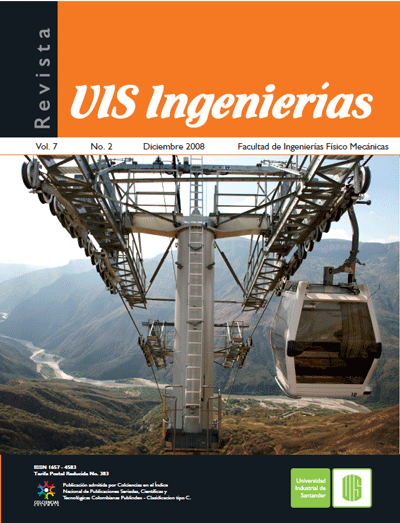Incidence of the hydraulic power conversion factor in the solution of the problem of the minimum cost hidrotermic dispatch
Published 2008-12-03
Keywords
- Hydraulic Power,
- hydroelectrical generation,
- hydrothermal dispatch,
- mixed binary linear programming
How to Cite
Abstract
The reliability of the solution obtained for the hydrothermal economic dispatch problem directly depends on the exactitude shown by the estimate value of the hydraulic power when it is resolved by mixed binary linear programming. Such level of exactitude can be measured based on the average relative error. This error increases as the percentage variation grows between hydraulic power conversion factors (max. and min. value). This article confirms the impact that such percentage difference has had in the reliability of the obtained solution. Consequently, five tangible examples have been exposed. Each one of them refers to a company satisfying an energy demand in a medium term planning horizon. In addition, the company must have possession of one hydroelectrical and two thermal generation centers.
Downloads
References
J. García González y E. Parrilla. “Improving the B&B search for large-scale hydrothermal weekly scheduling problems”. Electrical Power and Energy Systems. Vol 28, No 5, June 2006, pp. 339-348.
J. García Gonzalez y G. Castro. “Short-term Hydro Scheduling with cascaded and head-dependent reservoirs based on Mixted-Integer Linear Programming”. IEEE Porto Power Tech Conference. 10-13 September 2001, Porto, Portugal.
O. Nilsson and D. Sjelvgren. “Mixted Integer Programming Applied to short term planning of a hydrothermal system”. IEEE Transactions on Power Systems. Vol 11, Issue 1, February 1996, pp. 281-286.
S.Soares and G. Da Cruz. “Non-Uniform Composite Representation of Hydroelectric System for LongTerm Hydrothermal Scheduling”.IEEE Transaction on Power System, Vol 11, No 2, May 1996, pp.702-707.
J. P. S. Catalao, S. Mariano and V. M. Mendes. “Parameterisation effect on the behaviour of a headdependent hydro chain using a nonlinear model”. Electric Power System Research. Vol 76, Issues 6-7, April 2006, pp. 404-412.
J. M. Ngundam, F. Kenfack, and T. T. Tatietse. “Optimal scheduling of large-scale hydrothermal power systems using the Lagrangian relaxation technique”. Electrical Power and Energy Systems, Vol 22, Issue 4, May 2000, pp. 237-245.
E. Ni, X. Guan, and R. Li. “Scheduling Hydrothermal Power System with Cascaded and Head-Dependent Reservoirs”. IEEE Transaction on Power System, Vol 14, Issue 3, Aug. 1999, pp. 1127-1132.
M. V. F. Pereira and L.M.V.G. Pinto. “Stochastic optimization of a multireservoir hydroelectric system: A descomposition approach”. Water Resources Research, Vol 21, Issue 6, 1985, pp. 779-792.
R. Naresh, J. Sharma. “Short term hydro scheduling using two phase neural network”. Electrical Power and Energy System, Vol 24, Issue 7, October 2002, pp. 583-590.
Wong S. Y. W., “Hybrid simulated annealing/genetic algorithm approach to short term hydrothermal scheduling with multiple thermal plants”. Electrical Power and Energy system. Vol 23, Issue 7, October 2001, pp. 565-575.
X. Yuan, Y. Yuan, and Y. Zhang. “A hybrid chaotic genetic algorithm for short term hydro system scheduling”. Mathematics and Computers in Simulation. Vol 59, Issue 4, June 2002, pp. 319– 327.
A. Conejo, J. M. Arroyo, J. Contreras y F. Apolinar Villamor. “Self-Scheduling of a Hydro Producer in a Pool-Based Electricity Market”. IEEE Transactions on Power Systems, Vol. 17, No. 4, November 2002. pp. 1265-1272.

